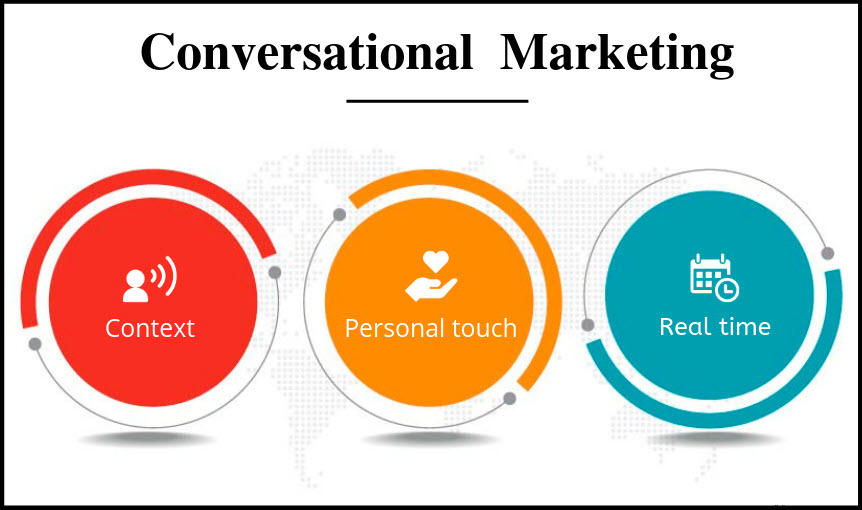Table of Contents
Conversational marketing is a dynamic customer engagement approach focusing on personalized and interactive experiences. In today’s digital era, it has gained significant importance as businesses strive to connect with customers. The growing demand for tailored interactions beyond traditional marketing drives this shift toward conversational marketing.
By understanding the niche aspects of conversational marketing, businesses can leverage this marketing form to create memorable experiences and forge stronger connections with their target audience.
Ready to optimize your Facebook social media strategy? Check out this blog to learn how Facebook Creator Studio can help you monitor activity.
The Power of Messaging Platforms
Messaging platforms play a pivotal role in the success of conversational marketing. They offer a range of benefits and opportunities for businesses to engage with their customers effectively. Here’s why messaging platforms are crucial in conversational marketing.

Exploring the Different Messaging Platforms Used in Conversational Marketing
Conversational marketing leverages various messaging platforms, including live chat on websites, social media messaging apps, and dedicated messaging platforms. These platforms provide businesses multiple channels to connect and communicate with their customers. Businesses can leverage these apps to facilitate real-time conversations, share multimedia content, provide personalized interactions, and even integrate call center services for immediate assistance.
Benefits of Leveraging Popular Messaging Apps for Customer Engagement
Popular messaging apps like WhatsApp, Facebook Messenger, and WeChat boast extensive user bases and offer convenient channels for customer engagement. Businesses can leverage these apps to facilitate real-time conversations, share multimedia content, and provide personalized interactions that resonate with their audience.
Niche Messaging Platforms for Specific Industries or Target Audiences
In addition to popular messaging apps, niche messaging platforms cater to specific industries or target audiences. Platforms like Slack for team communication or industry-specific messaging solutions enable businesses to tailor their messaging experiences to the unique needs of their customers.
Looking to run an epic influencer marketing campaign on Instagram? NeoReach has the best experience in creating viral campaigns that convert on social media. Sign up here!
Conversational Marketing vs. Instant Messaging
Conversational marketing and Instant Messaging (IM) share similarities in their approach to real-time communication and interactive conversations. Both methods foster immediate, two-way interactions that prioritize personalization and customer engagement.
In addition, they offer opportunities for businesses to provide prompt support, gather insights, and build relationships. However, there are notable differences between conversational marketing and IM in terms of their purpose, integration with marketing strategies, lead qualification and nurturing, data collection, and industry application.
While conversational marketing focuses on leveraging real-time conversations to drive marketing goals, IM has a broader scope encompasses personal and professional communication. Conversational marketing strategically integrates with marketing strategies to qualify leads and nurture them through targeted conversations, while IM may not have the same level of focus in this area.
Moreover, conversational marketing emphasizes data collection for marketing insights, whereas IM may not prioritize data gathering for the same purposes. Lastly, conversational marketing finds niche applications in various industries, while IM is a versatile communication tool across industries.
However, there is potential synergy between conversational marketing and IM. Recognizing the overlap, businesses can leverage the shared characteristics to enhance their marketing efforts. Companies can capitalize on existing user bases and engagement by integrating conversational marketing into IM platforms to create seamless customer experiences. Aligning IM and conversational marketing strategies ensures consistency and personalization across messaging platforms and channels.
Want to learn about LinkedIn’s Algorithm? Check out this blog for more information.
Chatbots: Automation and Personalization
Chatbots play a pivotal role in conversational marketing by serving as automated conversational agents. They are designed to handle various tasks, from answering frequently asked questions to guiding users through specific processes. Chatbots provide immediate responses and assistance by automating conversations, ensuring round-the-clock availability and prompt customer support.
Automating conversations through chatbots brings several benefits to businesses. Firstly, it enhances efficiency by handling common queries and automating routine tasks, freeing up human resources to focus on more complex inquiries. Secondly, it ensures consistent and accurate responses, eliminating the possibility of human error. Chatbots can also handle conversations simultaneously, enabling businesses to scale customer interactions effectively.
To create personalized experiences, chatbots employ various personalization techniques. They can utilize customer data to tailor responses and recommendations based on individual preferences and behaviors. Chatbots can understand customer intent by analyzing user interactions and providing more relevant and customized information. This personalization enhances the chatbot experience, making interactions more engaging, valuable, and customer-centric.
Learn about which social platforms will suit your business best here.
Real-Time Interactions: Driving Engagement and Conversions
Real-time interactions form the backbone of conversational marketing, catalyzing customer engagement and driving conversions. Businesses employ various strategies to leverage the power of real-time conversations, nurturing leads and maximizing sales.
Engaging customers in real-time conversations is a key strategy for businesses. Businesses can establish immediate connections through live chat on websites, social media messaging apps, or dedicated messaging platforms. They can swiftly address customer inquiries, offer instant support, and foster meaningful interactions that resonate with their audience by being available in real-time.
Interactive conversations in real-time also play a pivotal role in lead nurturing. Businesses gain valuable insights into their needs and preferences by engaging prospects in personalized discussions. This enables them to provide tailored recommendations and guide prospects through the buyer’s journey, building trust and establishing strong relationships that lay the foundation for successful conversions.
Real-time interactions further contribute to driving conversions and sales. By providing instant support, businesses can promptly address customer concerns and overcome potential objections, effectively removing barriers to purchase. Leveraging the power of real-time conversations, businesses can offer personalized product recommendations, exclusive discounts, or incentives that influence buying decisions and propel conversions.
To ensure your team operates efficiently, consider using team task management software. This software can help your support team stay organized, manage their tasks effectively, and prioritize customer inquiries
Customer Insights: Gathering and Leveraging Data
Utilizing conversational marketing enables businesses to collect valuable customer insights. Through real-time conversations, businesses gain direct access to customer preferences, pain points, and purchasing behaviors. This data provides a deeper understanding of individual needs and facilitates the creation of targeted marketing campaigns.
Analyzing conversations serves as a goldmine for market research and customer profiling. Businesses can identify trends, patterns, and emerging customer preferences by mining data from interactions. This valuable information helps refine customer segmentation, develop more accurate buyer personas, and align marketing strategies with specific target audiences.
Applying data-driven insights is essential for optimizing marketing strategies. By leveraging customer insights, businesses can personalize messaging, tailor product recommendations, and create relevant content that resonates with their audience. Data-driven decision-making ensures marketing efforts are strategic, impactful, and generate higher engagement and conversion rates.
Conclusion
Conversational marketing represents a paradigm shift in customer engagement, delivering personalized experiences and real-time interactions to drive business success. Businesses can forge deeper connections with their audience and achieve marketing goals by leveraging messaging platforms, chatbots, and customer insights.
Looking to the future, conversational marketing will continue to evolve with emerging trends and technologies. Voice-based conversational interactions and AI-driven personalization will shape the landscape, offering exciting opportunities for businesses to create immersive experiences and deliver highly tailored conversations.























